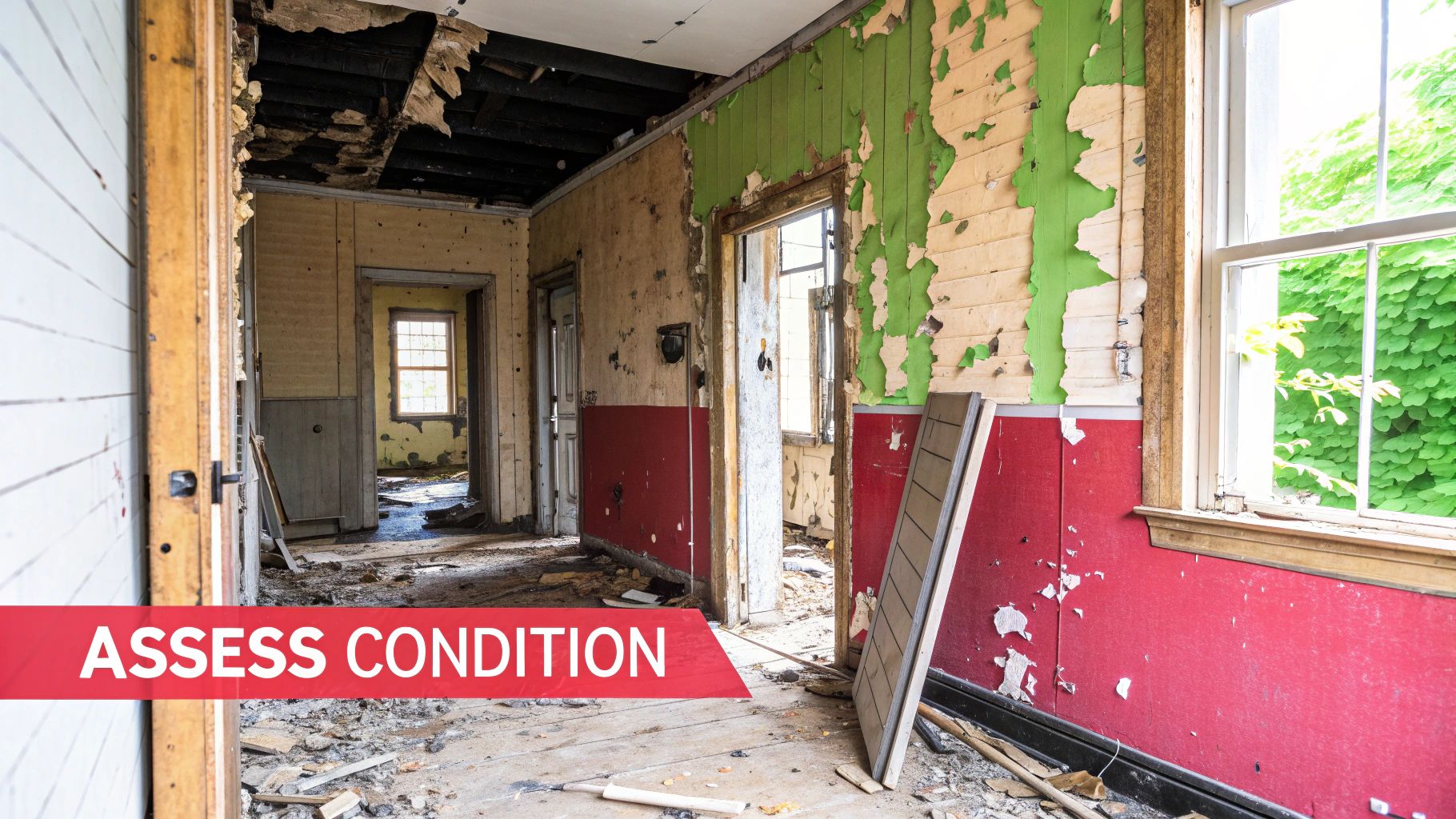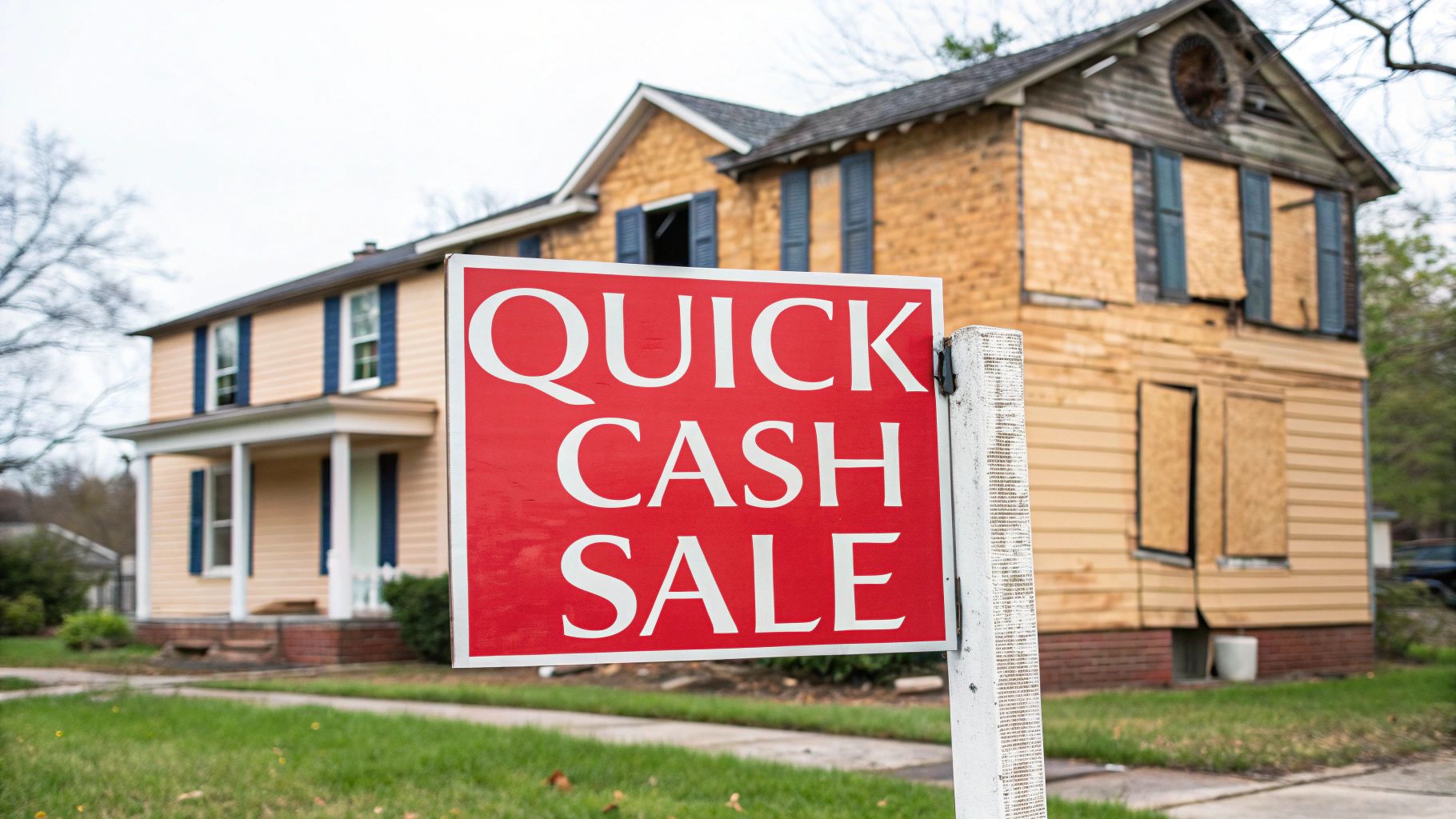Selling a home that needs significant repairs can feel overwhelming. Staring at a leaking roof, an outdated kitchen, or a cracked foundation can make you feel stuck, wondering if anyone will ever want to buy your property. The thought of pouring thousands of dollars into renovations you can't afford, or dealing with picky buyers who will criticize every flaw, is enough to cause sleepless nights for any homeowner in Cleveland.
The good news is you have more options than you think. You are not forced to spend a fortune on contractors or let your house sit on the market for months. From making strategic repairs to selling your house "as-is" for cash, there is a path forward that fits your budget, timeline, and stress level. This guide will provide actionable steps and clarity, helping you navigate the process and find the best solution for your situation.
What “Bad Condition” Really Means

The phrase "bad condition" can sound intimidating, but in the Cleveland real estate market, it’s a broad term. What one person sees as a deal-breaker, an investor might view as an opportunity. A house is generally considered to be in "bad condition" when it has issues that affect its safety, structure, or basic livability. We're not talking about cosmetic issues like dated wallpaper; we're talking about significant problems that scare away traditional homebuyers and their mortgage lenders.
Here are some common situations that qualify a property as a "fixer-upper" or in "bad condition":
- Structural Issues: Visible foundation cracks, bowing basement walls, a sagging roofline, or termite damage.
- Major System Failures: An old or non-functioning furnace (HVAC), outdated and unsafe electrical wiring (like knob-and-tube), or corroded, leaking plumbing.
- Roof and Water Damage: An actively leaking roof that has caused water stains on ceilings, mold growth, or rotted wood.
- Outdated Interiors: Kitchens and bathrooms that are 20+ years old and require a full gut renovation.
- Code Violations: Unpermitted additions or electrical work that doesn't meet current safety standards in cities like Lakewood or Parma.
- Severe Neglect: Hoarding situations, fire or smoke damage, or major pest infestations.
For a typical buyer seeking a mortgage, any one of these problems can stop a sale in its tracks. Lenders won't approve a loan for a property with significant structural or safety defects. This is why selling to a cash buyer, who doesn't need bank financing, is often the most reliable way to sell a house in bad condition.
Your Main Options for Selling a House in Poor Condition
When you need to sell a house that needs repairs, you have several distinct paths you can take. Your choice depends on your financial situation, how quickly you need to sell, and your tolerance for stress. Let's break down the main options available to Cleveland homeowners.
Make Repairs Before Selling
This is the traditional route where you invest time and money to fix up the house before listing it on the open market.
- Pros: Potentially achieve a higher final sale price and appeal to a larger pool of retail buyers who want a move-in-ready home.
- Cons: Requires significant upfront cash for contractors and materials. The process can be time-consuming, with unexpected delays and the stress of managing renovations. There's also no guarantee you'll recoup your investment.
Sell As-Is to a Cash Buyer
This involves selling your property directly to a real estate investor or a "we buy houses" company for cash, without making any repairs.
- Pros: The process is incredibly fast and simple. You sell the house without repairs, pay no agent commissions or closing costs, and get a guaranteed sale. Closings can happen in as little as 7-14 days.
- Cons: The offer will be lower than the full retail market value of a renovated home. This is a great option for inherited homes, avoiding foreclosures in Cleveland, Ohio, or when you need to move quickly.
List With an Agent As-Is
You can hire a real estate agent to list your property on the MLS in its current condition.
- Pros: You avoid the upfront cost of repairs while still getting broad market exposure.
- Cons: The sale process is much slower than with a cash buyer. The house may sit on the market for a long time, attract lowball offers, and you'll still have to pay agent commissions (typically 5-6%). Deals can also fall through due to financing or inspection issues.
Auction or Wholesale
These methods are geared toward a quick sale, often to other investors.
- Pros: Sales can happen very quickly, sometimes in a single day.
- Cons: You have less control over the final sale price, which is often lower than what you'd get from a direct cash buyer. The process can also involve marketing fees.
Why Cash Buyers Are the Most Common Solution
Trying to sell a house in bad condition on the traditional market is an uphill battle. Most retail buyers depend on bank loans, and lenders are extremely cautious about financing properties with major problems like foundation issues or a failing roof. This is where cash home buyers shine. They use their own funds, completely bypassing the hurdles of mortgage approvals, appraisals, and bank-required repairs.
Cash buyers are professional investors who see the potential in a property. They are experts at assessing repair costs and have a straightforward formula for making an offer.
They look at three key numbers:
- After Repair Value (ARV): What your house would be worth on the market in a Cleveland suburb like Strongsville if it were fully renovated.
- Cost of Repairs: Their estimated cost to fix everything from the foundation to the roof.
- Their Selling Costs & Profit: The costs they will incur to hold and resell the property, plus their minimum profit margin.
The biggest benefits for you are speed, certainty, and simplicity. You get a guaranteed sale without the hassle of showings, the uncertainty of appraisals, or the risk of a buyer's financing falling through.
Real-world example: A Cleveland family inherited a home in Old Brooklyn that needed over $25,000 in repairs, including a new roof and updated electrical. Instead of draining their savings and managing contractors for months, they sold as-is to a cash buyer. They closed in 10 days and walked away without the financial burden, saving them a massive headache and upfront cost.
Steps to Sell Your House As-Is
Selling your house to a cash buyer is a straightforward process designed to be stress-free. Here are the simple steps to follow.
- Get a Free Cash Offer: The first step is to contact a few reputable, local cash home buyers in the Cleveland area. Reputable companies will provide a free, no-obligation offer based on the information you provide about your property.
- Evaluate Multiple Offers: Don’t feel pressured to take the first offer you receive. Getting quotes from two or three different companies gives you perspective and ensures you're getting a fair price for your home's current condition.
- Understand the Numbers: A transparent buyer will explain their offer using the ARV formula: ARV – Repair Costs – Selling Costs = Your Offer. This shows you how they arrived at the price, reflecting the home's future potential minus the investment required to get it there.
- Review the Contract Carefully: Once you accept an offer, you'll receive a simple purchase agreement. Read it to ensure there are no hidden fees or inspection clauses that would allow the buyer to change the price or back out easily. A legitimate buyer uses a clear, simple contract.
- Close Quickly: The final step is the closing. You get to choose a closing date that works for your schedule. Some buyers can close in as little as 7 days, giving you cash in hand and allowing you to move on.
Tips to Maximize Your As-Is Sale Price

Even though you're selling as-is, a few small, no-cost efforts can improve the offers you receive. The goal is to help buyers see the property's potential, not just its problems.
- Declutter and Clean: You don't need to renovate, but a deep clean and removing clutter makes a huge difference. It makes rooms feel larger and helps the buyer accurately assess the property's layout and condition without distractions. A small effort here signals that the home has been cared for, potentially leading to a higher perceived value.
- Market with Honest Photos and Descriptions: Be upfront about the property's condition. Take clear photos of both the good and the bad. Honesty builds trust with potential buyers and ensures you're dealing with serious investors who understand what they are buying.
- Highlight Location, Lot Size, or Rental Potential: Point out the property's best assets. Is it in a desirable Cleveland neighborhood like Tremont? Does it have a large backyard? Is it zoned for a multi-family rental? These features add value beyond the structure itself.
- Compare Buyers: Talk to several cash buyers. Choose the one who is most transparent, professional, and communicates clearly. Trust and confidence in your buyer are just as important as the final offer price. You can take a closer look at U.S. housing market trends or national property price trends to see how the market is behaving, but local expertise from a trusted buyer is invaluable. Or check out this global real estate market report.
Frequently Asked Questions
Do I need to make any repairs before selling?
No. When you sell a house as-is to a cash buyer, you don’t need to make any repairs at all. The buyer purchases the property in its exact current condition. They will handle all the necessary renovations after the sale is complete.
Will I get lowballed if my house is in bad shape?
A reputable cash buyer will make a fair offer based on a clear formula: the home's After Repair Value (ARV) minus their repair and selling costs. While the offer will be less than what a fully renovated home would sell for, it reflects the true market value of the property in its current state, saving you the cost and hassle of repairs.
Can I sell with liens or back taxes?
Yes, absolutely. This is a common situation. Experienced cash home buyers can work with you to resolve liens, back taxes, or other title issues. Typically, these outstanding debts are paid off from the sale proceeds at closing, allowing you to walk away free and clear.
How fast can a cash sale close?
One of the biggest advantages of a cash sale is speed. Since there are no banks or lenders involved, the process is much faster. Most cash sales can close in as little as 7 to 14 days, but a flexible buyer can also work on your timeline if you need more time.
Final Thoughts
Even if your house needs a lot of work, you have options. Selling a property in bad condition doesn't have to be a stressful, expensive, or lengthy process. By understanding your choices—from making repairs to selling as-is—you can take control of the situation and choose the path that best suits your goals. For many homeowners in Cleveland, selling to a cash buyer provides the speed, simplicity, and certainty needed to move forward with confidence.
If you’re looking to sell a house in bad condition, contact Home Sweet Home Offers for a free, no-obligation cash offer today. We can help you understand your options and provide a fast, fair solution.
If you’re ready to skip the repairs and uncertainty, Home Sweet Home Offers can provide a fair, no-obligation cash offer for your property. Find out how we can help you by visiting https://www.homesweethomeoffers.com.
Article created using Outrank

